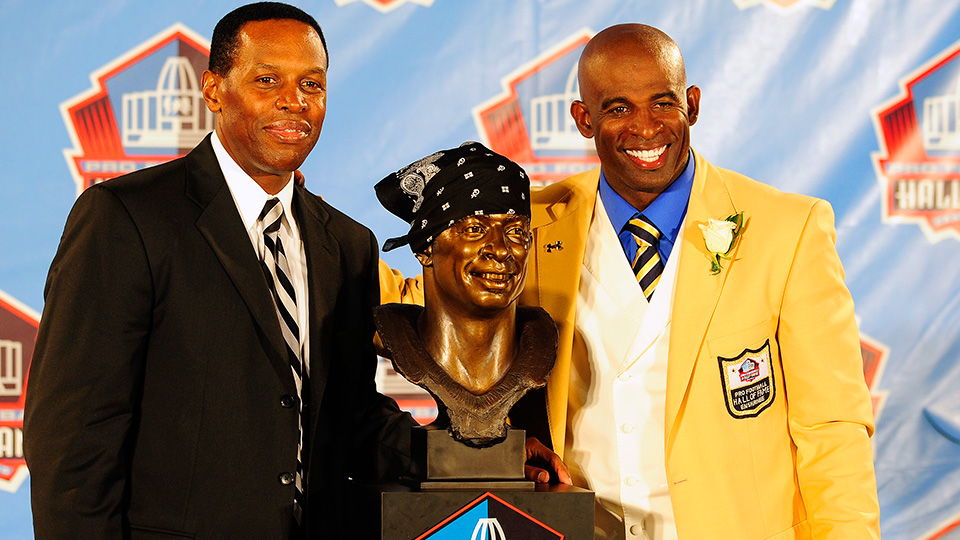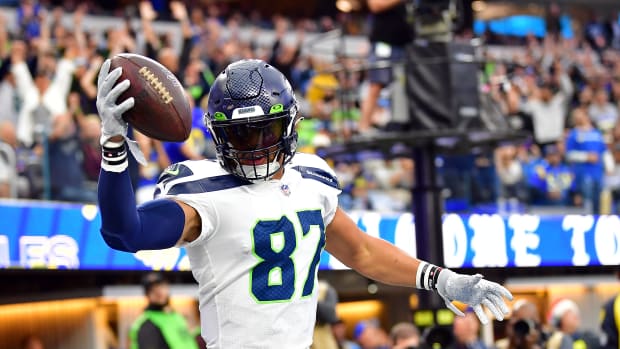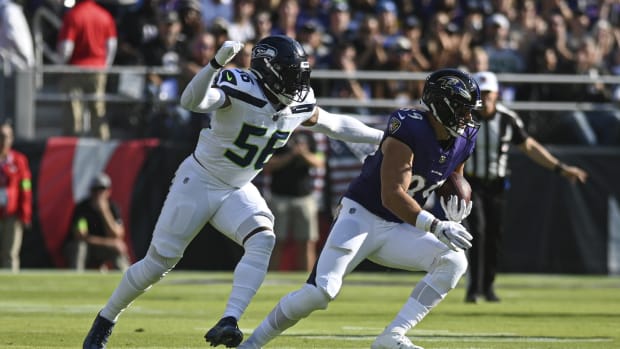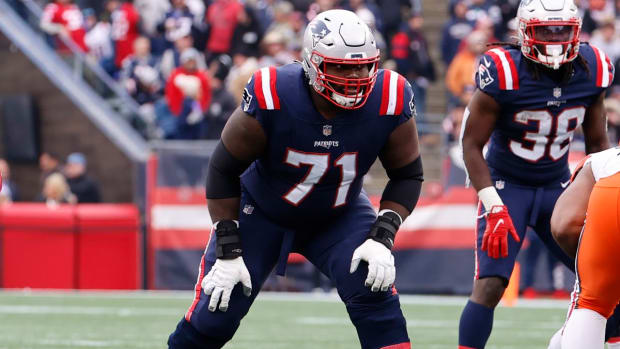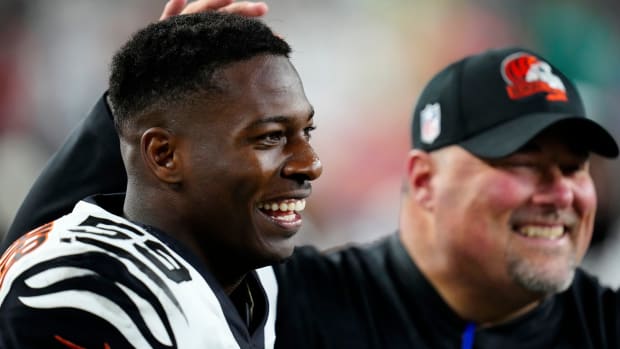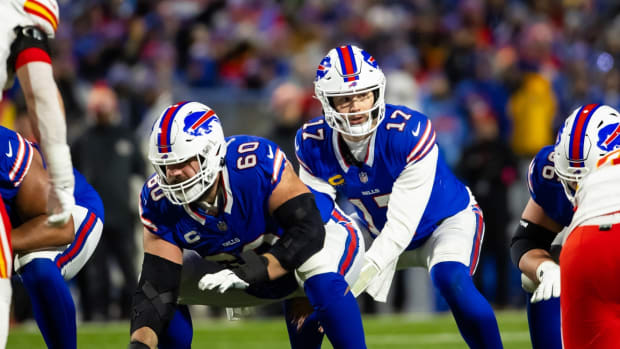Remembering Eugene Parker, a rare agent who didn't seek the spotlight
Get all of Jon Wertheim's columns as soon as they’re published. Download the new Sports Illustrated app (iOS or Android) and personalize your experience by following your favorite teams and SI writers.
For years, so many sports agents worth their leather binders and their hair product—and, inevitably, they were male—claimed that they had provided the inspiration for Jerry Maguire. Yes, they were the island of rectitude in a sea of filth, the dolphin swimming in the shark tank, the honest man in Babylon.
Eugene Parker never made these claims. He didn’t look like Jerry Maguire, and practicing, as he did, out of an office in small town Indiana, Parker didn’t lead Jerry Maguire’s flashy, bicoastal existence. Mostly though, Parker didn’t have to sell himself that way, didn’t have to rely on a fictitious movie character to animate his values and his mode of doing business.
Parker, who died two weeks ago at age 60, was known in NFL circles as a power player but an honest broker. His clients loved him. The team executives across the table appreciated him. Even rival agents accorded him an uncommon measure of respect, albeit of the grudging variety.
• MMQB: Eugene Parker's business was people
You learn in sports media to praise a sports agent at your peril. But be clear: Parker was a pioneering figure. At a time when pro athletes were disproportionately black and their representation was not, Parker served as one of the first African-American agents in team sports. And yet, as he told prospective clients, “If you’re going to hire me only because of my skin color, you need to do more interviewing.”
Parker had a backstory to rival that of any client. He was raised in Fort Wayne, Indiana, by a single mom who demanded her son attend parochial school. When she couldn’t afford the full tuition, the principal made a deal: Eugene worked odd jobs after his classes to make up the shortfall. “Where I grew up, we resolved conflict physically; that determined if you were right or not,” he said. “Now, I was somewhere where you resolved conflict verbally. That was completely foreign to me. I think that’s when I first started to appreciate the power of persuasion.”
NFL agent Eugene Parker dies at 60
One rainy day when he was in high school, Parker went with a group to the Rialto Theater in Fort Wayne to watch “The Spook Who Sat by the Door,” a controversial movie about a black CIA agent who internalizes what he learned and starts a revolution. Parker’s friends and cousins didn’t think much of the movie, but he was transfixed. “I don’t want to cause a revolution from a negative standpoint,” he once told me. “But what I’ve learned is that sometimes the best way to get ahead is to be very quiet and non-threatening, so people won’t shoot you, literally or figuratively. Then, by the time they’re ready to shoot you, you’ve built a fortress so you can withstand their shots.”
Parker was a good student and a better athlete. He went to Purdue on a basketball scholarship. When the coach, Fred Schaus, asked Parker what his goals were, the freshman responded: “I want to go to law school.” No, your basketball goals, Schaus stressed. Parker responded: “I want to use basketball to go law school.”
As it was, Parker started all four years, made an all Big Ten team and was picked by the Spurs in the fifth round of the 1978 NBA Draft. When he didn't make the team, he was something other than crushed. “Understand, the NBA was never a goal for me,” he said, “so I never thought of not getting there as a failure.”
Parker attended Valparaiso’s law school, graduated in 1982 and figured he'd combine his twin passions of sports and the law by becoming an agent. He got an early glimpse into the seamier side of the profession when he had an internship with an NBA agent in New Jersey who was indicted for funneling money from his clients’ holdings into a personal account.
• WERTHEIM: Bud Collins, veteran tennis journalist, dies at 86
When Parker struck out on his own, his first client was another Purdue athlete, Roosevelt Barnes, a basketball player who used a final year of eligibility to play football and ended up making the Detroit Lions' roster. (Paying back this loyalty, Parker would later hire Barnes as his business partner.)
While Parker's client list expanded, his tastes did not. Maybe ten years ago, I was writing on the intersection of sports, race and the Midwest and spent a day with Parker. At the time, he was among the most prominent agents in sports. His office was outside Fort Wayne in Roanoke, Indiana, a blink-and-you-miss-it town, wedged between a VFW Hall and a used furniture store. When clients would visit, they’d laugh and encourage him to move. “I like it here,” he’d tell them. “It’s not a get-rich-quick state.”
Will Smith was a good man, taken away for no good reason
Parker’s practice would grow to include dozens of NFL players, from Emmitt Smith to Larry Fitzgerald. In the mid-90s, Parker represented Deion Sanders. During a walk in the Texas woods with Jerry Jones, Parker seized a deal whereby Sanders would receive a (then astronomical) $13 million signing bonus in exchange for a more modest salary. The player would get his money. The Cowboys would avoid the cap hit. The league would institute a “Deion Rule,” to close this loophole. But credit Parker for seeing the opportunity. As Jones would later put it, "Eugene Parker is who I would call to represent me right now if I needed an agent."
Having heard that I would be featuring Parker for that book years ago, another agent warned me not to buy Parker’s “shtick,” as he called it. “Trust me,” he said. “There are no saints in this business. Look, it’s a lucrative business, it’s challenging as hell and sometimes it’s even fun. But it’s not exactly a higher calling, not even for Eugene Parker.” When I asked Parker if he wanted to respond, he demurred: “When you speak badly of other agents, you’re just lowering the profession.”
He would eventually move to a bigger city, Fort Wayne. That was mostly because he needed the space. And even then—even in sports-crazed Indiana—most of the populace had no idea that a prominent agent who oversaw more than $2 billion in NFL contracts worked in their town.
Parker was always okay with that. In a look-at-me profession, he was happy when gazes were fixed elsewhere. Instead, he simply did his job with competence and honor. Whether it was a competing agent or his adversary in a negotiation, by the time they were ready to shoot him, he'd built the fortress to withstand their shots.
Eugene Parker's funeral will take place on Saturday, April 16 in Fort Wayne, Ind.
































